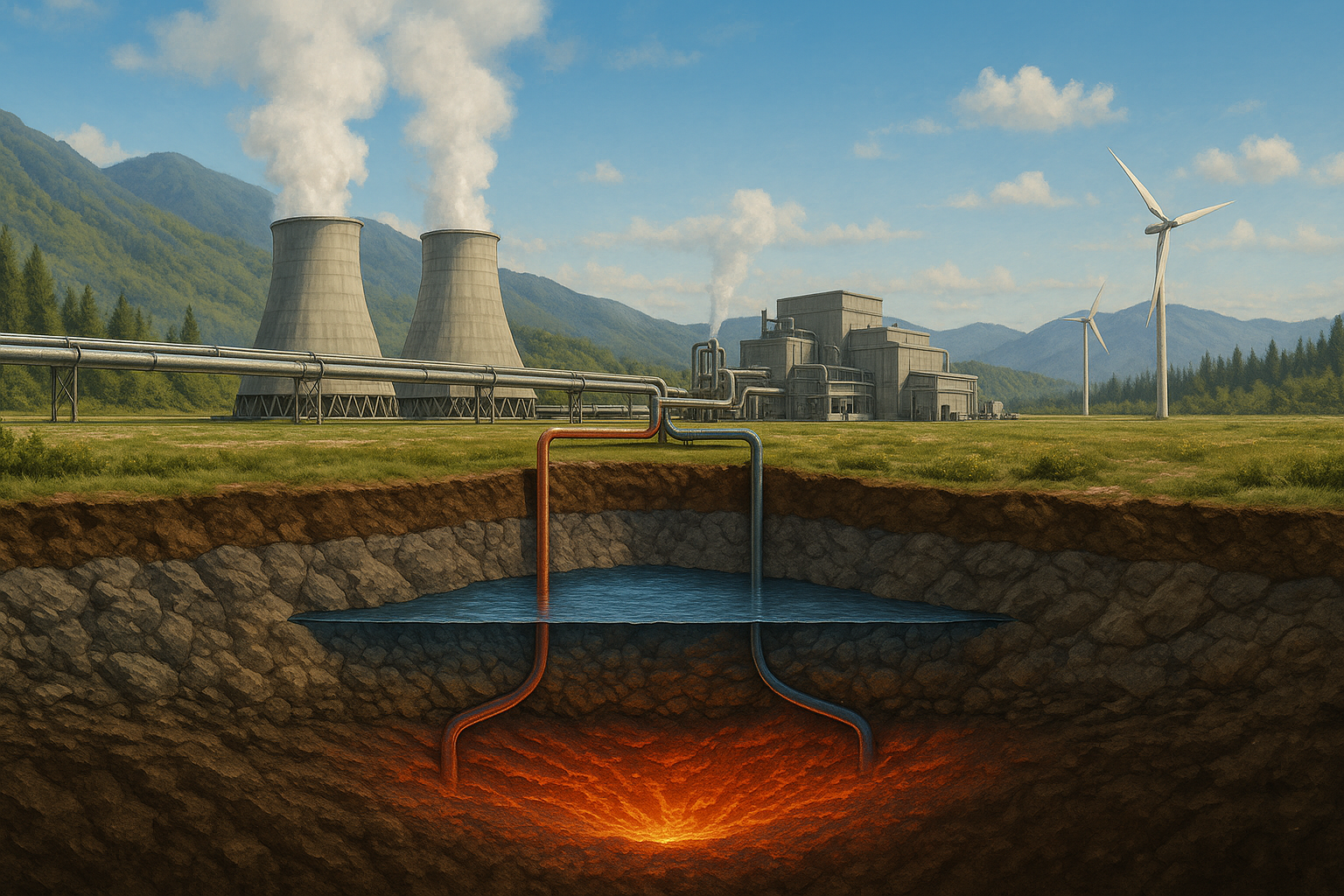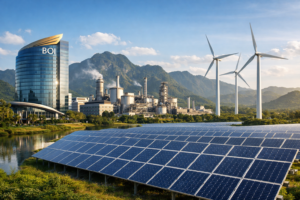พลังงานความร้อนใต้พิภพ(Geothermal Energy) คือพลังงานความร้อนที่สะสมอยู่ใต้พื้นผิวโลก ซึ่งเกิดจากความร้อนที่สะสมอยู่ในแกนกลางของโลกและมีการถ่ายเทความร้อนขึ้นมายังเปลือกโลก ความร้อนนี้สามารถนำมาผลิตไฟฟ้าหรือความร้อนได้ ปราศจากการ ปล่อยก๊าซคาร์บอนไดออกไซด์
หลักการทำงานง่าย ๆ
1. การหาแหล่งพลังงาน: จะมีการสำรวจและเจาะหลุมลงไปในชั้นหินที่อุ้มน้ำร้อนหรือไอน้ำที่มีอุณหภูมิสูง
2. การนำพลังงานขึ้นมา: น้ำร้อนหรือไอน้ำที่ได้จากใต้ดิน จะถูกสูบขึ้นมายังพื้นผิว
3. การผลิตไฟฟ้า:
- โรงไฟฟ้าแบบไอน้ำแห้ง: ไอน้ำที่มีอุณหภูมิสูงจะถูกนำไปหมุนกังหันของเครื่องกำเนิดไฟฟ้าโดยตรง
- โรงไฟฟ้าแบบแฟลช: น้ำร้อนจะถูกลดความดัน ทำให้เกิดไอน้ำ แล้วนำไอน้ำไปหมุนกังหัน
- โรงไฟฟ้าแบบไบนารี: น้ำร้อนจะถูกนำไปถ่ายเทความร้อนให้กับสารทำงานอื่นที่มีจุดเดือดต่ำกว่า (เช่น ไอโซบิวทีน) แล้วนำสารทำงานที่กลายเป็นไอไปหมุนกังหัน
4. ปล่อยกลับคืน: น้ำที่เย็นลงแล้วจะถูกปล่อยกลับลงไปใต้ดิน หรือบางส่วนอาจนำไปใช้ประโยชน์อื่นๆ เช่น อุ่นน้ำสำหรับใช้ในครัวเรือน หรือในโรงงานอุตสาหกรรม
ข้อดีของพลังงานความร้อนใต้พิภพ
- จ่ายไฟต่อเนื่อง 24 ชม. ไม่ขึ้นกับแดดหรือลม ช่วยเสริมเสถียรภาพให้โครงข่ายไฟฟ้า
- ปล่อยคาร์บอนต่ำมาก
- ใช้พื้นที่น้อย เมื่อเทียบกับโซลาร์ฟาร์มหรือกังหันลมในกำลังผลิตเท่ากัน
- อายุการใช้งานยาว โรงไฟฟ้าหลายแห่งทำงานเกิน 40 ปีและยังเดินเครื่องต่อเนื่อง
ศักยภาพในประเทศไทย
ประเทศไทยตั้งอยู่บนขอบ “รอยต่อแผ่นเปลือกโลกอินโด-ออสเตรเลีย” ช่วงภาคเหนือและตะวันตกมีแหล่งน้ำพุร้อนกระจายหลายจุด กรมพัฒนาพลังงานทดแทนฯ ประเมินว่า พื้นที่เช่น อำเภอฝาง จ.เชียงใหม่ และอำเภอแม่สอด จ.ตาก มีอุณหภูมิน้ำร้อนเพียงพอสำหรับระบบ Binary Cycle หากพัฒนาเต็มศักยภาพอาจผลิตไฟฟ้าได้หลายสิบเมกะวัตต์ ลดการนำเข้าก๊าซและช่วยกระจายแหล่งพลังงานสะอาดในประเทศ
สรุป
พลังงานความร้อนใต้พิภพคือแหล่งไฟฟ้าสะอาดที่ผลิตได้ตลอดวัน ใช้พื้นที่น้อย และปล่อยคาร์บอนต่ำมาก แม้การสำรวจ-เจาะหลุมเริ่มต้นสูง แต่เมื่อลงทุนแล้วต้นทุนดำเนินงานอยู่ในระดับคงที่และแข่งขันกับโรงไฟฟ้าฟอสซิลได้ในระยะยาว หากประเทศไทยต่อยอดงานวิจัยและพัฒนาโครงการนำร่องสำเร็จ พลังงานใต้ดินนี้จะเป็นจิ๊กซอว์สำคัญในการขับเคลื่อนเศรษฐกิจ Net Zero ของเราในอนาคต







